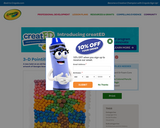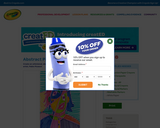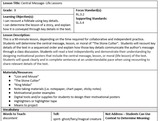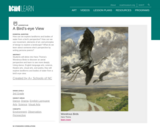
In this lesson, students explore the artwork of Georges Seurat and create a masterpiece.
- Subject:
- Arts Education
- Material Type:
- Lesson Plan
- Provider:
- Crayola
- Date Added:
- 06/14/2018

In this lesson, students explore the artwork of Georges Seurat and create a masterpiece.

In this lesson, students observe and discuss realistic and abstract portraits, and compare and contrast the differences. Students will then create a whimsical, abstract self-portrait in the style of Cubist artist, Pablo Picasso.

Students will explore beauty in nature, learn the structure of the leaf/purposes of the leaf, learn draped slab forming technique, exhibit skills and craftsmanship in handling clay and exhibit skill in glazing.

Students will learn and apply the basic fundamentals of weaving as they use construction paper to create a woven mat. They will incorporate basic measurement and geometric concepts as they create their individual projects.

Students will take on a mystery, Sherlock Holmes style, to uncover the secrets, history, and deeper meanings of Moyo Ogundipe's painting Soliloquy: Life's Fragile Fictions.
Students will be able to: explain why Ogundipe used particular colors, patterns, and images for his painting; discuss what the snakes and birds symbolize in the picture; and express in their own words at least three reasons the different elements of the painting are a treasure.

Students will use their animal sketches and notes from the last art class to generate ideas and create a 3-D paper hand puppet of the animal they chose to study. Teacher will demonstrate a variety of paper sculpture and folding techniques. Students will use these paper sculpture techniques and choose contrasting colors/shapes to create an expressive hand puppet with big, bold, and expressive elements of art. Some recycled papers will be used to teach recycling and conserving of our paper resources. Fraction folding techniques/terminology will integrate math into this art lesson. This lesson was developed by Nancy McGuire as part of their completion of the North Carolina Global Educator Digital Badge program. This lesson plan has been vetted at the local and state level for standards alignment, Global Education focus, and content accuracy.

Students will put on their 'detective hats' and use magnifying glasses to find evidence that supports attributing the paintings in the Molleno Altar Screen to one artist and one piece. They will work in small groups and present a case to share with the entire class. They will also explore what would need to be different for them to prove that the pieces do not belong together.
Students will be able to: describe what an altar screen is; state that Molleno painted the scenes for this particular altar screen; develop and support a theory or hypothesis using details and logic; and share what they think and have learned with other students and the teacher.

This lesson is to introduce students to the art of mixed media through the introduction of an illustrated story about overcoming personal adversity.

Students will determine the central message, lesson, or moral of “The Stone Cutter”. Students will recount key details of the text in a sequenced order and explain how those key details communicate the author’s message through a class discussion. Students will read a text independently and demonstrate their understanding by designing motivational posters that include the central message, lesson, or moral (life lesson) of the text. Students will speak clearly and in complete sentences at an understandable pace when using recounting to share relevant details of the text. Students will also illustrate the moral of The Lion and The Mouse.

Students will learn the concept of and procedure for changing color value. They will then apply these new understandings as they create their own abstract scribble design and use a monochromatic palette to paint their design with watercolor paint.

Students will delve into Hans Thoma’s Wondrous Birds to discover an aerial perspective and learn to see more deeply. Using dance, English language arts, science, theatre arts, visual arts, and poetry, they will explore landforms and bodies of water from a bird’s-eye view.

Students will use their observational skills as they observe and discern different geometric shapes, art elements of line and space, and art principles of emphasis and balance found within the construction of their playground equipment. The students will analyze playground equipment, identifying the various elements incorporated in the construction of the pieces

This lesson features a glue relief self portrait and personal portrait image covered with aluminum foil on the outside cover. On the inside are special messages about the "artist" and his or her special image.

Students will construct their own "pieces of the pie" using concepts of primary, secondary and intermediate color.

Students will learn and apply the basic fundamentals of still life drawing as they create an original composition based on found items in the classroom. They will incorporate language arts concepts such as listening, inferring and summarizing as they listen first to a model story and then complete an original story based on their projects.

Students will understand the difference between a sculpture and a drawing or painting, understand the meaning of the word silhouette and will create a simple silhouette of any animal or object they choose and use that drawing to create a sculpture piece which is mounted to a wooden base.

This free website provides more than 600 adaptable lesson plans written by teachers in collaboration with the Denver Art Museum for more than 130 objects from the museums world-class art collection. Lesson plans and resources focus on inspiring students to think and problem-solve creatively. Organized in an easy way so that teachers can pick the topic they would like to explore or enhance, then use works of art to teach that subject.
High resolution images are included. Museum visits are not necessary to implement lesson plans. Includes professional and student development tools such as teacher workshops and webinars, virtual classroom courses, career videos, educator blogs and creativity tools. Easy for teachers in language arts, social studies and visual arts to provide a curriculum rooted in the arts while also meeting 21st Century Skills.